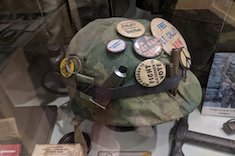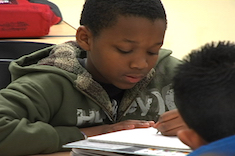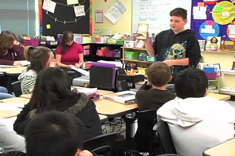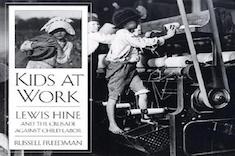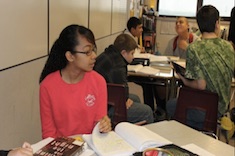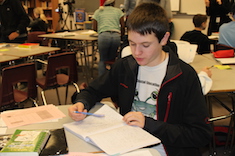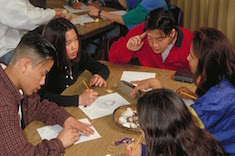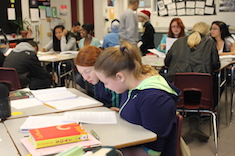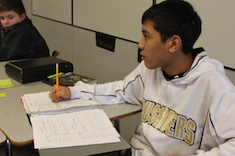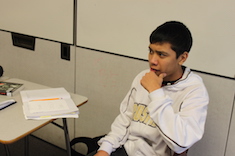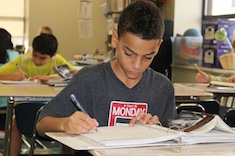Mark Levine
Mark Levine is a social studies teacher at John J. Lukancic Middle School in Romeoville, Illinois. You can follow his latest thinking at Levine Writes.
Latest Content
Multiple Perspectives Cultivate Empathy
Mark Levine explores ways to cultivate empathy by sharing texts with multiple perspectives on the same event in his middle school social studies class.
Engaging Students with Humor
Mark Levine finds humor is the “secret sauce” in engaging middle school students and including introverts in the classroom community.
Read Alouds in Content Classes
Mark Levine explains the many ways read alouds can enhance and deepen learning for middle school students in content areas like social studies and science.
Building Interest Through Artifacts
Mark Levine has many students who haven’t traveled much more than 100 miles from home. He makes history come to life for them by bringing artifacts into his middle school classroom.
Observing Skilled Readers
Mark Levine wonders why his most some of his most skilled readers take the most time to get through texts. So he asks them, and gets some fascinating answers he uses to assist struggling students.
Pairing Video Clips with Text: The Great Depression
Mark Levine has his middle school students “closely read” paired videos as well as texts to ponder the value and accuracy of different historical sources.
Self-Esteem and Literacy: Understanding Jeff
Jeff is apathetic and unengaged. To help this middle school learner, Mark Levine needs to understand his history. Mark shows the power of interviews for connecting with struggling teen learners.
Collaborating for Understanding in Writing
Mark Levine realizes explaining expectations for an essay assignment over and over again isn’t working. But when he has students write in pairs for a portion of his workshop, magic happens.
Magic Connections: Young Adult Literature in a Social Studies Class
Mark Levine shows how young adult literature is a potent tool to drive learning in his middle school social studies classroom.
The Freewrite Pause
Mark Levine finds his middle school students need more time to digest learning from brief articles. Freewriting provides the perfect pause for promoting more reflection and insight.
Whole-Class Reflection in Middle School
Mark Levine explains why whole-class reflection is an essential component of his middle school workshops.
Introducing Social Studies Concepts with Picture Books
Mark Levine explains how picture books are powerful teaching tools in his middle school classroom.
Reading and Thinking Aloud in Middle School
Mark Levine combines reading and thinking aloud in a minilesson to help his middle school students grapple with complex texts.
Summer Literacy
“What can I do to help my son and daughter stay sharp and not lose momentum during the summer?” When a parent asks this question, Mark Levine offers his Top Six Summer Slide Preventers.
Releasing the Teaching to Students
Mark Levine releases responsibility for teaching and assessment to students late in the school year, and hears echoes of learning from previous units.
Mindful Test-Taking
High-stakes tests weigh on teachers and students through the winter and spring. Mark Levine shares mindfulness strategies for test-taking, explaining how to help students recommit and refocus in the midst of an exam.
High Standards and Struggling Learners
Mark Levine explains why high standards can be helpful even for students who are struggling in his middle school classroom.
Student-Led Minilessons in Middle School
One student’s request to lead a minilesson is a catalyst for Mark Levine to see the value of student-led minilessons as an assignment for all in his middle school classroom.
Russell Freedman Book Clubs
Mark Levine finds Russell Freedman book clubs are a great way for his middle school students to deepen their understanding of history and empathize with young people who have lived through previous eras.
Getting to Know Each Other Through the Work
Mark Levine explains why he dives right into work in his middle school classroom, rather than getting-to-know-you activities. And through the work, a community is born.
Three-Word Meditation
Mark Levine depends upon a simple meditation strategy during the required moment of silence in his classroom to begin each day with a calm sense of purpose.
Stop and Inquire
Mark Levine capitalizes on what captures his middle school students’ attention with his Stop and Inquire routine.
Tips for Student Podcasting
Mark Levine details a podcast assignment he used with his middle school students to explore civil rights topics, including software options, a template to help students get organized, and a realistic timeframe.
Daily Reflection Rubric
Mark Levine always has a few students each year in his middle school classroom who are stunned by their poor grades, even when they clearly aren't meeting expectations. He develops a rubric to enable students to monitor and reflect on their learning behaviors daily.
Reflecting on the L
Mark Levine wonders if his middle school students are spending enough time reflecting on the L in K-W-L, so he creates a form to help.
Balancing Reading and Talk
Mark Levine finds that the best way to deal with controversial topics like slavery in his middle school classroom is with open and focused whole-class discussions.
Creating Curiosity with Story
Mark Levine finds that the secret to engaging students in what might be perceived as dry historical topics is to create curiosity with story.
The Daily Record
Mark Levine uses the “daily record” to encourage reflection throughout each day’s workshop in his social studies classroom.
The Pocahontas Ewww: Writing and Inquiry for Context
Mark Levine finds his middle school students are appalled by some of the cultural differences from times gone by, and shares how he fosters more understanding.
Better Mondays Through Quick-Writes
Mark Levine uses quick-writes with his middle school students to set the expectation at the start of the week for work together that is independent, thoughtful, and conversational.
“What Are We Learning Today?”: Transitioning with Compelling Questions
Mark Levine helps his seventh-grade students transition to the learning of the day with a "compelling question" posted on the board before each class session.
Strategic Seating
Mark Levine finds that good seating design in middle school isn’t just about where you place furniture—it’s about negotiating with students.
Browse Content By
Type
Category
- Assessment Tools
- Big Fresh Archives
- Booklists
- Choice Numeracy
- Classroom Design
- Common Core
- Community Building
- Conferring
- Content Literacy
- Digital Literacy
- English Language Learners
- Equity
- Family Relations
- Free Samples
- Guiding Groups
- Leadership
- Literacy Coaches
- Mentor Texts
- Minilessons
- New Teacher Mentors
- Podcasts
- Poetry
- Quote Collections
- Reading Strategies
- Self Care
- Struggling and Striving Learners
- Talking and Listening
- Teacher Study Groups
- Teaching Reading
- Teaching Writing
- Word Study and Vocabulary
Author
- Melissa Quimby
- Nawal Qarooni
- Gwen Blumberg
- Julie Cox
- The Lead Learners
- Hannah Tills
- Josie Stewart
- Ruth Metcalfe
- Mallory Messenger
- Becca Burk
- Jodie Bailey
- Vivian Chen
- Mary Brower
- Tiffany Abbott Fuller
- Stephanie Affinito
- Ruth Ayres
- Leigh Anne Eck
- Heather Fisher
- Shari Frost
- Julie Johnson
- Suzy Kaback
- Gigi McAllister
- Shirl McPhillips
- Melanie Meehan
- Cathy Mere
- Debbie Miller
- Tara Barnett and Kate Mills
- Tammy Mulligan
- Dana Murphy
- Bitsy Parks
- David Pittman
- Brenda Power
- Heather Rader
- Matt Renwick
- Mandy Robek
- Christy Rush-Levine
- Gretchen Schroeder
- Jen Schwanke
- Brian Sepe
- Katherine Sokolowski
- Stella Villalba
- Jennifer Vincent
Grade Level
Choice Literacy Membership
Articles
Get full access to all Choice Literacy article content
Videos
Get full access to all Choice Literacy video content
Courses
Access Choice Literacy course curriculum and training




